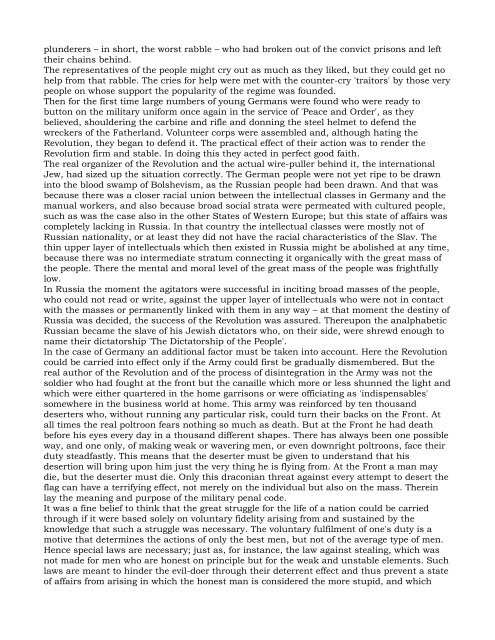Mein Kampf by Adolf Hitler
Mein Kampf by Adolf Hitler
Mein Kampf by Adolf Hitler
- TAGS
- kampf
- adolf
- hitler
- stuff2share.com
Create successful ePaper yourself
Turn your PDF publications into a flip-book with our unique Google optimized e-Paper software.
plunderers – in short, the worst rabble – who had broken out of the convict prisons and left<br />
their chains behind.<br />
The representatives of the people might cry out as much as they liked, but they could get no<br />
help from that rabble. The cries for help were met with the counter-cry 'traitors' <strong>by</strong> those very<br />
people on whose support the popularity of the regime was founded.<br />
Then for the first time large numbers of young Germans were found who were ready to<br />
button on the military uniform once again in the service of 'Peace and Order', as they<br />
believed, shouldering the carbine and rifle and donning the steel helmet to defend the<br />
wreckers of the Fatherland. Volunteer corps were assembled and, although hating the<br />
Revolution, they began to defend it. The practical effect of their action was to render the<br />
Revolution firm and stable. In doing this they acted in perfect good faith.<br />
The real organizer of the Revolution and the actual wire-puller behind it, the international<br />
Jew, had sized up the situation correctly. The German people were not yet ripe to be drawn<br />
into the blood swamp of Bolshevism, as the Russian people had been drawn. And that was<br />
because there was a closer racial union between the intellectual classes in Germany and the<br />
manual workers, and also because broad social strata were permeated with cultured people,<br />
such as was the case also in the other States of Western Europe; but this state of affairs was<br />
completely lacking in Russia. In that country the intellectual classes were mostly not of<br />
Russian nationality, or at least they did not have the racial characteristics of the Slav. The<br />
thin upper layer of intellectuals which then existed in Russia might be abolished at any time,<br />
because there was no intermediate stratum connecting it organically with the great mass of<br />
the people. There the mental and moral level of the great mass of the people was frightfully<br />
low.<br />
In Russia the moment the agitators were successful in inciting broad masses of the people,<br />
who could not read or write, against the upper layer of intellectuals who were not in contact<br />
with the masses or permanently linked with them in any way – at that moment the destiny of<br />
Russia was decided, the success of the Revolution was assured. Thereupon the analphabetic<br />
Russian became the slave of his Jewish dictators who, on their side, were shrewd enough to<br />
name their dictatorship 'The Dictatorship of the People'.<br />
In the case of Germany an additional factor must be taken into account. Here the Revolution<br />
could be carried into effect only if the Army could first be gradually dismembered. But the<br />
real author of the Revolution and of the process of disintegration in the Army was not the<br />
soldier who had fought at the front but the canaille which more or less shunned the light and<br />
which were either quartered in the home garrisons or were officiating as 'indispensables'<br />
somewhere in the business world at home. This army was reinforced <strong>by</strong> ten thousand<br />
deserters who, without running any particular risk, could turn their backs on the Front. At<br />
all times the real poltroon fears nothing so much as death. But at the Front he had death<br />
before his eyes every day in a thousand different shapes. There has always been one possible<br />
way, and one only, of making weak or wavering men, or even downright poltroons, face their<br />
duty steadfastly. This means that the deserter must be given to understand that his<br />
desertion will bring upon him just the very thing he is flying from. At the Front a man may<br />
die, but the deserter must die. Only this draconian threat against every attempt to desert the<br />
flag can have a terrifying effect, not merely on the individual but also on the mass. Therein<br />
lay the meaning and purpose of the military penal code.<br />
It was a fine belief to think that the great struggle for the life of a nation could be carried<br />
through if it were based solely on voluntary fidelity arising from and sustained <strong>by</strong> the<br />
knowledge that such a struggle was necessary. The voluntary fulfilment of one's duty is a<br />
motive that determines the actions of only the best men, but not of the average type of men.<br />
Hence special laws are necessary; just as, for instance, the law against stealing, which was<br />
not made for men who are honest on principle but for the weak and unstable elements. Such<br />
laws are meant to hinder the evil-doer through their deterrent effect and thus prevent a state<br />
of affairs from arising in which the honest man is considered the more stupid, and which


